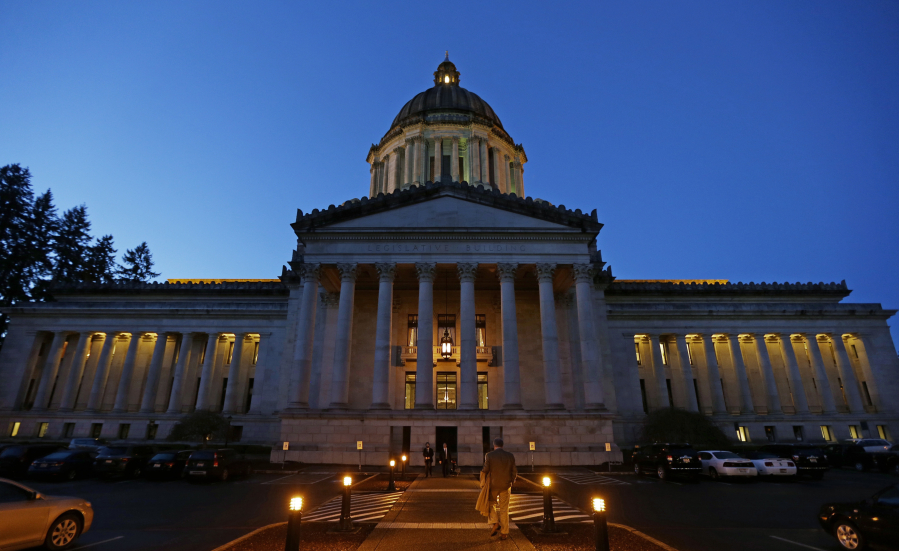When the Washington Legislature was in session, most of the nine members of Clark County’s delegation (Democrats and Republicans) would meet every week at one of their residences over a crock pot of chili, pizza or other dish and talk about how they could work together to direct funds to the region and help each other pass bills.
Before the Legislature adjourned its third special session Thursday night, local lawmakers said this approach had paid off with big rewards for the area.
But one hurdle remains after the Legislature debated Thursday on the $4 billon capital budget that contains what’s widely considered to be a significant funding package for Clark County. The two parties reached an impasse over how to resolve a court decision on rural water use.
“In my view, this has been one of our most positive and successful years,” said Sen. Annette Cleveland, D-Vancouver.
“We’ve been working very collaboratively in creating respectful relationships,” said Sen. Lynda Wilson, R-Vancouver.
While lawmakers tout their accomplishments, the session exposed some key differences among lawmakers, as well as more work to be done.
Transportation, capital
The state’s $8.6 billion transportation budget directs $717 million in funding for local projects in Clark County that will fund improvement to state Highway 14, the interchange at I-205 and Mill Plain Boulevard and others.
Rep. Vicki Kraft, R- Vancouver, said that residents are used to hearing that Seattle gets most of the money, but she and others pointed to this year’s capital budget — though not approved — as a positive step for the area.
“This capital budget win we got was very successful and significant for our region,” she said.
The budget, if passed, would include $48.8 million in new appropriations for projects in Clark County, such as $500,000 toward the construction of the Bridgeview Education and Employment Resources Center, plus $1.7 million for a recovery center for Daybreak Youth Services, a nonprofit that provides treatment services for teens with mental health and chemical-dependency issues.
“The entire capital budget is very jobs heavy,” said Rep. Sharon Wylie, D-Vancouver.
Cleveland said that if the budget isn’t passed, it will mean investments won’t be made in communities around the state that could spur economic development.
Bridge bill
One of the most significant pieces of legislation passed was SB 5806, which sets up a process aimed at finding a way to replace the chronically congested Interstate 5 Bridge. In 2013, the Columbia River Crossing, the previously proposed replacement for the bridge, died in the Senate, and the legislation seeks to jumpstart talks on finding a new solution.
“The easy part was passing the bill,” Wylie said. “We will only succeed if we can hold people’s attention.”
Although the bill was signed by Gov. Jay Inslee earlier this spring, the process it outlines begins as soon as later this summer.
The bill carves out $350,000 for the Washington State Department of Transportation to take inventory and catalog previous work done on the Columbia River Crossing, which will be delivered in a report in December. The bill also creates a legislative action committee composed of lawmakers and officials from state agencies in Oregon and Washington.
Rep. Paul Harris, R-Vancouver, said he expects that in coming weeks, Washington legislative leaders will name members to the committee and that letters will be sent out to officials in Oregon to begin negotiations.
“I think a lot of it is relationship work with Oregon and figuring out the path forward together,” said Sen. Ann Rivers, R-La Center, who said talks could begin as soon as August. But she said it will take five years for the bridge to be replaced. Harris estimated seven to 10 years.
But not everyone in Clark County’s legislative delegation supported the measure. Representative Liz Pike, R-Camas, and Kraft both voted against it and have advocated for a third crossing.
“Replacing the I-5 Bridge in the same failed corridor has diminishing returns,” said Pike, who said she was too busy to attend the weekly dinners with her colleagues. Pike said that congestion problems are caused in the Rose Quarter. “It’s not going to do a bit of good.”
Pike unsuccessfully sponsored a bill to create a similar bistate work group that wouldn’t be focused on replacing the I-5 Bridge. Kraft unsuccessfully offered an amendment that would look at an additional crossing.
Harris said that although replacing the I-5 Bridge would only relieve “some” congestion, he said that committee will allow officials from Oregon and Washington to begin considering new crossings.
“It will look at all bridges,” Harris said. “But we have infrastructure now that needs to be taken care of.”
McCleary and more
What took up the most time and energy in the Legislature’s regular session and three special sessions was school funding. In 2012, the Washington State Supreme Court issued what’s known as the McCleary decision, which ordered the state to fully fund basic education and end disparities between poor and affluent districts.
Facing a government shutdown, the Legislature on June 30 passed its $43.7 billion two-year operating budget that directed $1.8 billion in additional spending for education in the state.
While Cleveland supported the increased funding, she was the only senator from Clark County who ended up voting against it on grounds that it relied on increased property taxes, which critics decried as regressive.
On the House side, Rep. Brandon Vick, R-Vancouver (who did not respond to requests for comment), was joined by Kraft and Pike in being the only representatives from Clark County to vote against it.
Kraft and Pike said they opposed the budget because the state is already taking in more revenue from the improved economy and would rather see state government slimmed down than increase taxes.
“When we spend like crazy in a robust economy, we are not preparing our state for the rainy day that’s going to happen,” said Pike.
Inslee also signed a revenue bill that included an expansion of an online sales tax collection. Mark Brown, a lobbyist for Vancouver, said that tax could mean $4 million more for the city over five years.
The revenue bill also extended tax incentives for manufacturers of semiconductors, which Wylie and Cleveland said are important the area’s economy. However, Inslee vetoed part of the revenue bill that gave a tax break to manufacturers, a move that disappointed Rivers and Harris.
“Do I want to fight for that (tax break) again?” Harris said. “Absolutely, I do.”
Rail bill
During the sessions, Inslee vetoed one of the more significant bills for Clark County before later signing a more slimmed-down version of it. In May, Inslee vetoed HB 1504, a bill sponsored by Pike that passed both houses with overwhelming bipartisan support.
The bill would have allowed “freight rail dependent uses” and “short line railroad” to the Growth Management Act. Pike said the bill would allow development along the Chelatchie Prairie Railroad in Clark County and create thousands of manufacturing jobs. However, Inslee nixed the measure out of concerns it would undermine protection for farmland.
Wilson said that after vetoing it, Inslee contacted her and asked her to narrow down the Senate version of the bill. The bill that Inslee ultimately signed allows these developments in Clark and Okanogan counties.
“It’s rare to get an opportunity to work on a bill that’s been vetoed,” said Wilson.
Public facilities district
Stonier said that one of her biggest legislative achievements was the passage of HB 1201 that will allow public facilities districts, such as Vancouver’s, to get better financing.
PFDs are taxing jurisdictions set up to finance facilities, such as the Special Events Center in downtown Vancouver, with local sales and use taxes. The bill extends the timeframe PFDs are allowed to collect these taxes from 25 to 40 years (as long as the bonds aren’t retired). Money from the taxes can be used to improve, rehabilitate or expand the facilities. Stonier said that PFDs can also be financed with better rates.
Brown, the lobbyist for the city of Vancouver, said that the bill could mean another $28 to $30 million for its PFD and called it a “big win.”




